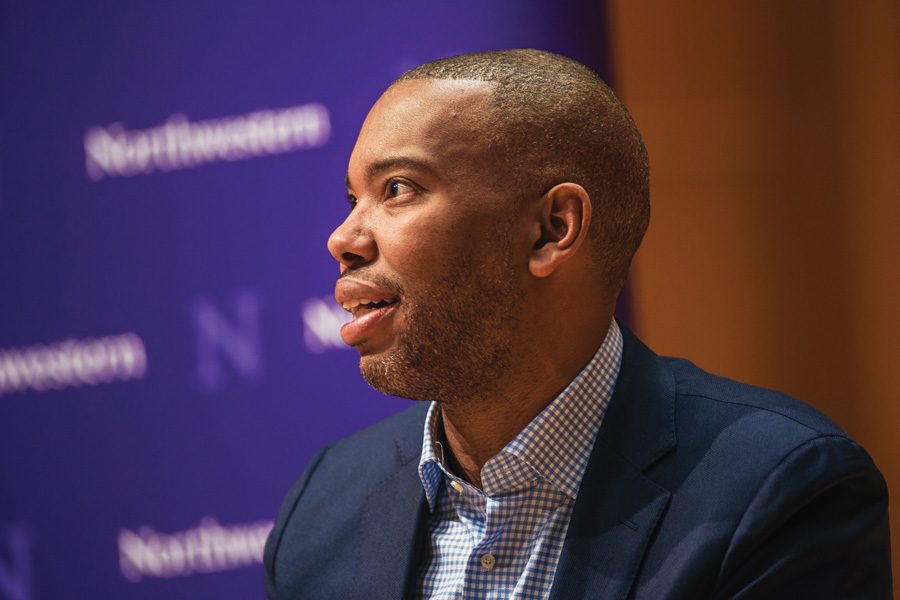Journalist Ta-Nehisi Coates discusses Trump, race in America
Noah Frick-Alofs/The Daily Northwestern
Journalist Ta-Nehisi Coates speaks at Pick-Staiger Concert Hall on Tuesday. Coates and Prof. Mary Pattillo discussed a range of topics, from politics to race to literature, at an event organized by the Contemporary Thought Speaker Series.
February 1, 2017
In front of a packed audience at Pick-Staiger Concert Hall, writer Ta-Nehisi Coates called Donald Trump’s presidency the “clearest evidence of white supremacy” in America during a talk Tuesday night.
Coates, a national correspondent for The Atlantic and author of National Book Award-winning “Between the World and Me,” spoke about politics, writing, and his experience as a black man and father in a nearly 90-minute conversation with African American studies and sociology Prof. Mary Pattillo.
Currently on leave from The Atlantic to work on a new book, Coates has written a number of longform pieces for the magazine, notably the 2014 Polk Award-winning essay “The Case for Reparations,” and most recently his January cover story “My President Was Black,” which reflects on President Barack Obama’s legacy — and how Trump’s election serves as a rebuttal.
Coates said he was “shocked,” but ultimately not surprised by Trump’s widely-unexpected election. He said there was an “anti-black influence” in the Trump movement.
“Black folks can’t be Donald Trump,” he said. “If you were that foolish about the world, you might be shot.”
Pattillo and several students who had submitted questions prior to the event examined themes in “Between the World and Me.” The memoir, written in the form of a letter to his son Samori, describes Coates’ experience as a black man in the United States.
Pattillo acknowledged the tone of the book is “not the most hopeful,” but she and Coates agreed that while struggle is integral to the black experience, so is having joy and pride in one’s identity.
“While racism is depressing and white supremacy is depressing,” Pattillo said, “being black is not depressing.”
The event was hosted by the Contemporary Thought Speaker Series and co-sponsored by the Office of the President, Weinberg College’s Simeon Leland Fund, the Office of Student Affairs, the Buffett Institute for Global Studies and the political science department. CTSS co-chair Ben Zimmermann said the event was a “resounding success” due to the wide range of subjects Coates and Pattillo discussed.
“He is the perfect CTSS speaker,” the Weinberg junior said. “He touched on literally endless issues that are relevant to us as college students as well as the community as a whole … We’re hoping that it’s going to generate a really important conversation throughout campus.”
Weinberg sophomore Jamal Julien, who attended the event, said Coates’ talk and work has inspired him to study non-American black history through art.
“I love that his voice as a black man is highlighted as a black man, not as a voice for black people,” said Julien, a sociology major. “His work in giving … a piece of the voice of blackness is very much inspirational for me personally.”
Coates said pursuing social change through individual passions — as he said he attempts to do through his writing — is a fulfilling approach to activism.
For young people frustrated with the current political climate, Coates urged them to engage from the “inside out, not outside in.”
“The process should not be … people looking out at the world and saying, ‘I would like for there to be change in the world, how do I do that,’” Coates said. “Because if you are in the business of justice, and making this society more democratic, you might get a lot of disappointment … You better love what you’re doing along the way.”
Email: [email protected]
Twitter: @marissahpage


